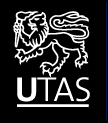Jessica Nilsson – PhD confirmation seminar
Date: Friday 27 January, 3:30pm
Venue: IMAS Seminar Room, Sandy Bay
Abstract:
The abundance of fish stocks is subject to human impacts such as overfishing, habitat destruction, pollutants including urban run-off and sewage, and large scale stressors such as climate change. Increasing evidence demonstrates synergistic impacts on fish stocks among these disturbances. Despite increased efforts in fisheries research and conservation, over-exploited fisheries still prevail. Fisheries managers and politicians are further faced with the challenge of balancing sustainable marine production and biodiversity with food security, economic considerations (e.g. wealth generation and employment opportunities) and potential political pressure.
Taking a holistic view on the complex biological, environmental, political and socioeconomical interactions that affect the sustainability of marine ecosystems and fisheries, this research investigates what sources might trigger fisheries collapse and recovery. Twenty-five marine systems world-wide will be investigated looking at the environmental, biological and conservation measures, or lack thereof, that affect the sustainability of their fisheries. The Convention on the Conservation of Antarctic Marine Living Resources (CCAMLR) will be used as a case study to examine conservation measures and outcomes during its 30 years history. Gathering expert knowledge and experience from fisheries scientists, fisheries managers, fishers and NGOs a survey will further explore the challenges of governing fisheries. The meta-analysis, governance survey and case study together aim to identify the connections among the environmental, socioeconomic and conservational variables (either individually or in a combination) that make a fishery prone to collapse or recover.


